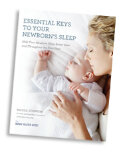
Newborn babies are so wonderful, aren’t they? They’re all soft, new skin and sweet-smelling heads and tiny, adorable features. I remember each one of my children as newborns, and each of them just broke my heart with their cuteness when they were tiny.
But caring for a newborn? Trying to figure out feedings and naps and swaddling and all the things that go along with parenting a new baby?
That usually doesn’t feel so wonderful. In fact, if you’re a new parent, it may feel totally overwhelming!
Whether you’re a brand-new, first-time parent who’s completely befuddled by your baby, or whether you’re a “seasoned veteran” parent who’s expecting another baby and just needs a refresher course in newborn care – we can help. Keep reading for our top 15 newborn baby sleep and feeding tips! (And don’t forget, you can download our newborn free guide, 15 Baby Sleep Facts New Parents Need To Know!)
15 Newborn Baby Sleep and Feeding Tips
1. Swaddle Your Newborn Full disclosure: swaddling is generally a great way to help newborns sleep longer and more soundly, but not all babies like to be swaddled. You may need to try different swaddling techniques, until you find one that works with your baby’s temperament – or, you may need to scrap swaddling altogether! Of course, whatever you do, remember that safety comes first, with swaddling – never put a swaddled baby face-down in the crib, never co-sleep with a swaddled baby, and make sure that your swaddle is tight enough that the blankets won’t come loose, but not so tight that it interferes with hip movement or breathing.
2. Wear Your Newborn Baby Baby-wearing – when done safely – is a fantastic way to not only bond with your baby, but to also improve sleep. Even the fussiest, most colicky babies generally calm down when held snugly against mom or dad’s body! Wearing your baby can also be a great way to deal with reflux symptoms. (Keep reading for more info about reflux.)
3. Your Newborn Baby’s Colic If your baby is fussy all the time and just won’t settle, you may wonder if colic is to blame. It’s important to remember that periods of crying are normal in the newborn stage. But if that crying is intense and lasts for hours on end, then you may be dealing with colic.
4. Newborn Baby Fussiness It’s important to remember that not all fussiness is due to colic. It’s normal for newborns to have fussy spells – and fussy times of day, for that matter. In fact, many newborns are fussy in the later afternoon and early evening. This is generally referred to as “The Witching Hour”.
5. Room-Sharing and Co-Sleeping With Your Newborn Baby Many of us in the western world have been conditioned to believe that babies sleep in cribs, alone, in a separate room. And while that sleeping arrangement may work just fine for some families, many other families find that the inconvenience of having to walk down the hall for every night feeding and diaper change is more trouble than it’s worth. Room-sharing can be a great solution – simply sleep your newborn near your bed in a portable crib or bassinet. You can even use a product like the Arm’s Reach Co-Sleeper if you want to make nighttime nursing easy. Co-sleeping is a popular option for many families, too, since it makes breastfeeding super easy at night. Just be aware that co-sleeping absolutely must be done safely, if you intend to co-sleep with your newborn.
6. Your Newborn Baby’s Routine Gentle but consistent daily routines are GREAT for encouraging better sleep. The Eat-Sleep-Play routine (or the E.A.S.Y. routine, if you’re a Baby Whisperer fan) is great for newborns, as it helps gently guide sleep and feeding times. Remember, your routines don’t need to be driven by the clock – instead, use your baby’s sleep and feeding cues to shape your routines.
7. Newborn Baby Massage A bath may not be the most relaxing activity you can do with your baby, but baby massage is a VERY relaxing activity! Baby massage has been shown to help babies (and parents!) relax, and to promote better sleep.
8. Fresh Air and Sunlight What do fresh air and sunshine have to do with sleep? Plenty, actually. Did you know that exposing your baby to sunlight can go a long way towards helping re-set her circadian rhythms and to correct day/night confusion? It can – more on that in a moment! And fresh air helps, too – studies show that a daily dose of fresh air (like the kind you’d get from a brisk, 20 minute walk) really does help babies sleep better and longer.
9. Your Newborn Baby’s Day/Night Confusion Babies don’t spring from the womb understanding the difference between night and day – in fact, many newborns have their days and nights completely mixed up! If your baby sleeps all day and is up all night, you can take steps to correct this day/night confusion. Try feeding and playing with your baby in a brightly-lit room during the day, and then keep the room very dark and your interactions minimal at night.
10. Newborn Baby Awake Time Speaking of day/night confusion – one way to help your newborn sort out days and nights is to keep your baby awake for a short time between daytime feedings. However, be sure that your newborn’s wake time is on the short side – aim for 45 minutes or so in the first 6 weeks after birth.
11. Growth Spurts Your baby will go through many growth spurts in the first year of life, but a number of those happen during the newborn stage. It’s key to know approximately when these growth spurts will happen; it’s also key to feed your baby often during these times. It may feel like all your baby does is eat and sleep during a growth spurt, but that’s normal! You can read more about newborn growth spurts here.
12. Reflux Many babies spit up occasionally, but true reflux is something altogether worse – burning stomach acid and constant vomiting make sleep almost impossible! Fortunately, there are ways you can treat reflux at home, and can work to help your newborn sleep better even when reflux symptoms are bad. Read more about newborn reflux here.
13. Breastfeeding Breastfeeding is a great way to feed your baby, but many new moms find that breastfeeding is tougher than they’d anticipated. But you really can breastfeed your baby AND work towards better, longer sleep!
14. Sleep Associations Many of the strategies and techniques you will use to help your newborn sleep in the early weeks and months after birth may very well become negative sleep associations. If you rock or hold or swing or feed your newborn to sleep, pretty soon, she’ll NEED you to do those things at nap time and bedtime – and each time she wakes early. Sleep coaching is simply the process of gently helping your baby learn a new way to sleep – one that doesn’t involve you. However, don’t let the fact that your newborn may form sleep associations make you nervous – we usually recommend that you do whatever you have to do to help your baby sleep in the first two months or so after birth. Then, once you feel comfortable and your baby seems ready, you can slowly begin working towards more independent sleep. For instance, you can try putting your baby down slightly awake for the first morning nap – that’s a step in the right direction.
15. 3/4 Month Sleep Regression Why are we including a link to the 4 month regression in a newborn-focused article? Simple – this is the first big sleep regression a baby goes through, and it usually jumps up and bites parents in the backsides, in our experience! Most parents are floored by this regression – just as they get baby sleeping well at night and napping better, BAM. Baby is fussy as all get out, sleep falls apart, and mom and dad are left wondering what on earth happened. But don’t worry – we’ve helped thousands of parents with this sleep regression, so we know a thing or two about it!
Newborn Sleep Help That Works – Guaranteed!
Being the parent of a newborn is simultaneously the most difficult and the most wonderful thing on earth, isn’t it? But all of us at The Baby Sleep Site® know first-hand how exhausting and overwhelming it can be to try and help your newborn sleep well. Yes, newborns are supposed to wake around the clock for feeds, but that doesn’t mean you can’t gently encourage better, deeper sleep from your baby. And we can help with that! Connect with a consultant today, and she will craft a newborn-focused Personalized Sleep Plan® specifically for your baby, that aligns with your unique situation and challenges, and with your parenting goals.
Browse our list of consultation package options here.
Once you make your choice and purchase, you will immediately receive an e-mail with your Helpdesk login information. You’ll be able to log in and get started immediately!
Have any sleep or feeding tips? Share with others here!
 Essential Keys to Your Newborn’s Sleep is THE newborn sleep book that will help you to not only improve your newborn’s sleep using gentle, sleep-inducing routines – it will also answer your feeding and newborn care questions. You can even buy a bundle package that includes the e-book AND a Personalized Sleep Plan® PLUS a follow-up email to use for further support!
Essential Keys to Your Newborn’s Sleep is THE newborn sleep book that will help you to not only improve your newborn’s sleep using gentle, sleep-inducing routines – it will also answer your feeding and newborn care questions. You can even buy a bundle package that includes the e-book AND a Personalized Sleep Plan® PLUS a follow-up email to use for further support!
 Or, join our VIP Members Area packed with exclusive content and resources: e-Books, assessments, detailed case studies, expert advice, peer support, and more. It actually costs less to join than buying products separately! As a VIP member, you’ll also enjoy a weekly chat with an expert sleep consultant.
Or, join our VIP Members Area packed with exclusive content and resources: e-Books, assessments, detailed case studies, expert advice, peer support, and more. It actually costs less to join than buying products separately! As a VIP member, you’ll also enjoy a weekly chat with an expert sleep consultant.
Can’t decide which product or service is right for you? Visit our Getting Started Page for help.








